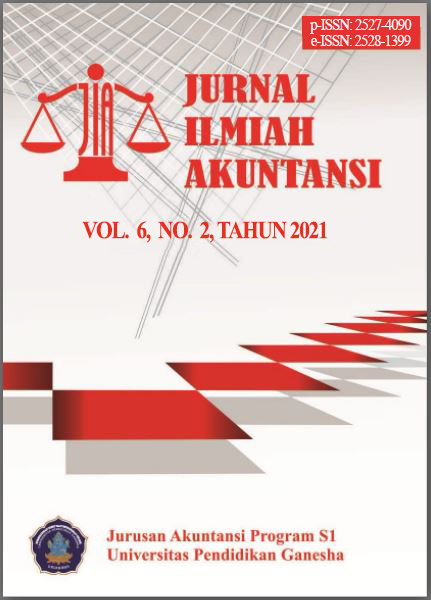Model for Increasing Micro and Small Enterprises Performance through Optimizing the Role of BUMDes
DOI:
https://doi.org/10.23887/jia.v6i2.40379Keywords:
MSEs, BUMDes, PerformanceAbstract
The micro and small enterprises (MSEs) performance inequality between districts/cities is a must-be-solved problem since inequality is one of the issues concerned in the Sustainable Development Goals. Much previous research on the role of Village-Owned Enterprises (Badan Usaha Milik Desa—BUMDes) performance revealed that BUMDes had a positive but not significant role. The reason is that BUMDes had not played an optimal role. This study aimed at building a model for improving the performance of Micro and Small Enterprises (MSEs) through optimizing the role of BUMDes. The data collected was primary data consisting of the causes of low MSEs performance, challenges, and opportunities for optimizing the role of BUMDes in improving MSE performance. Data were collected through a structured interview, in-depth interview, and Focus Group Discussion (FGD) methods. The results revealed that the model for improving MSEs' performance through optimizing the role of BUMDes was named the Dream House Model. This model requires that MSEs set a dream of experiencing a performance improvement that was set within three years. The main pillar in achieving this dream was that MSEs should revitalize and collaborate.
References
Amalia, A., Wahyu, H., & Agung, B. (2017). Analisis Strategi Pengembangan Usaha Pada UKM Batik Semarangan Di Kota Semarang. Jurnal Ilmu Administrasi Dan Bisnis.
Arief, R., Yani, I., & Rienna, O. (2017). Strategi Pengembangan Usaha Kecil menengah Sektor Industri Pengolahan. Artikel. Www. Google Cendekia.
Ayu, W. I. G., Sri Budhi, I. M. K., Saskara, I. A., & Yasa, I. G. W. M. (2015). Pengaruh Modal Sosial Terhadap Orientasi Kewirausahaan dan Biaya Transaksi Untuk Meningkatkan Kinerja Usaha Pada UKM Kerajinan Kayu di Provinsi Bali. Disertasi. Universitas Udayana.
Bismala, L., & Handayani, S. (2014). Model Manajemen UMKM Berbasis Analisis SWOT. Naskah Lengkap Seminar Nasional PB3I ITM.
Hendratmoko. (2021). FAKTOR-FAKTOR YANG MEMPENGARUHI KINERJA UMKM DI INDONESIA. JOBS (Jurnal Orientasi Bisnis Dan Enterpreneurship), 2(1). https://doi.org/https://academicjournal.yarsi.ac.id/index.php/jobs/article/view/1782 DOI: https://doi.org/10.33476/jobs.v2i1.1782
Herwiyanti, E., & Rafinda, A. (2021). Determinant Factor of Small Medium Enterprises to Access Bank Credit. JIA (Jurnal Ilmiah Akuntansi), 6(1), 37–45. https://doi.org/https://ejournal.undiksha.ac.id/index.php/JIA/article/view/29907
Irmawati, S., Delu, D., & Wahyu, P. D. (2013). Model Inklusi Keuangan Pada UMKM Berbasis Pedesaan. Jurnal of Economics and Policy (JEJAK). https://doi.org/http://journal.unnes.ac.id/nju/index.php/jejak
Mokodompit, M. P., Syarifuddin, & Mutiana, S. (2019). IDENTIFIKASI FAKTOR YANG MEMPENGARUHI KINERJA UMKM. Profita: Komunikasi Ilmiah Akuntansi Dan Perpajakan, 12(2), 242–248. https://doi.org/https://publikasi.mercubuana.ac.id/index.php/profita/article/view/profita.2019.v12.02.005
Munizu, M. (2010). Pengaruh Faktor-Faktor Internal dan Eksternal Terhadap Kinerja Usaha Mikro dan Kecil (MSB) di Sulawesi Selatan. Jurnal Manajemen Dan Kewirausahaan, 12(1), 33–41.
Notoatmodjo, S. (2009). Kesehatan Masyarakat “Seni dan Ilmu.” Rineka Cipta.
Sayuti, H. M. (2011). Pelembagaan Badan Usaha Milik Desa (BUMDs) Sebagai Penggerak Potensi Ekonomi Desa Dalam Upaya Pengentasa Kemiskinan Di Kabupaten Donggala. Jurnal Academica Fisip Untad, 3(2), 1411–3341.
Senen, M., & Sidharta, I. (2013). Model Kajian Pendekatan Manajemen Strategik Dalam Peningkatan Sektor UMKM di Kota Bandung. Jurnal Computech & Bisnis, 7(1), 56–66.
Setiyadi, S., Kifayah, A., & Taufiq, A. (2011). Penentuan Strategi Sustainability Usaha Pada UKM Kuliner Dengan Menggunakan Metode SWOT- AHP. Jurnal Ilmiah Teknik Industri, 10(2).
Sinarwati, N. K., AAIN, M., Utama, I. M. S., & Budhi, M. K. S. (2020). Does Entrepreneurship Supply Chain Management Mediate the Effect of VOE Resources and Social Capital to Performance of Craftsmen ? 9(5), 1695–1701. https://doi.org/https://ojs.excelingtech.co.uk/index.php/IJSCM/article/view/5639/2932
Sinarwati, N. K., & Marhaeni, A. (2019). The Role of Village Own Enterprises to Rural Development. South East Asia Journal of Contemporary Business, Economics and Law. The Role of Village Own Enterprises to Rural Development. South East Asia Journal of Contemporary Business, Economics and Law, 18(5), 77–83. https://doi.org/https://seajbel.com/wp-content/uploads/2019/04/seajbel5-VOL18_227
Sugis, S. R., & Kartika, L. (2014). Model Peningkatan Kinerja Usaha Kecil Menengah melalui Pengembangan Modal Insani dan Modal Sosial (Studi Kasus UKM Makanan dan Minuman di Kota Depok). Accelerating the World’s Research. https://doi.org/https://123dok.com/document/4yr7k0pq-peningkatan-kinerja-menengah-melalui-pengembangan-sosial-makanan-minuman.html.
Suryanto. (2021). FGD Model Peningkatan Kinerja Melalui Optimalisasi Peran BUMDes. Materi FGD Tanggal 25 September 2021. Penanggap Ahli BUMDes Atas Nama Rudy Suryato.
Tahwin, M., & Kusumaningsih, N. (2018). MODEL PENINGKATAN KINERJA USAHA KECIL DAN MENENGAH MENGGUNAKAN THE DREAM HOUSE MODEL (Studi Kasus Industri Batik Tulis Lasem Kabupaten Rembang).
Tambunan, T. (2012). UMKM di Indonesia. In Ghalia Indonesia.
Taufik, M. (2020). PRIORITAS PENGGUNAAN DANA DESA TAHUN 2021 DAN UPAYA REVITALISASI BUMDES. Jakarta: KEMENTERIAN DESA, PEMBANGUNAN DAERAH TERTINGGAL DAN TRANSMIGRASI, 55.
Widodo, I. S. (2016). Badan Usaha Milik Desa Sebagai Salah Satu Alternatif Sumber Pendapatan Desa Berdasarkan Undang-Undang No. 6 Tahun 2014 Tentang Desa. Jurnal Panorama Hukum, 1(1), 2527–6654.



1.png)


